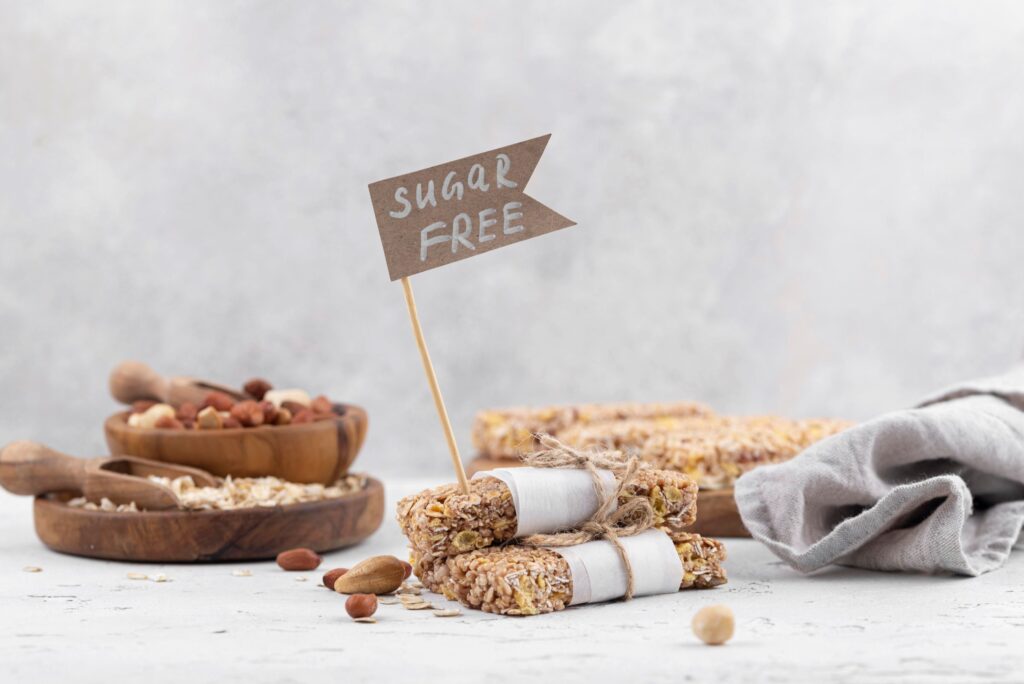In today’s health-conscious world, finding sugar substitutes and sweeteners to cut down on sugar consumption and without sacrificing taste has become a priority for many. Thankfully, the market offers a wide range of sugar substitutes and sweeteners that cater to various dietary needs and preferences. This comprehensive guide will delve into the world of sugar substitutes and sweeteners, providing valuable insights and options for those seeking healthier alternatives.
Sugar Substitutes and Sweeteners: Exploring Your Options

What Are Sugar Substitutes and Sweeteners?
Sugar substitutes and sweeteners are additives used to enhance the sweetness of food and beverages. Unlike traditional sugar, these alternatives often provide fewer calories or have a lower impact on blood sugar levels, making them suitable for diabetics, weight watchers, and anyone looking to lead a healthier lifestyle.
The Advantages of Using Sugar Substitutes

Sugar substitutes offer several advantages over regular sugar. They can aid in weight management, help control blood sugar levels, and reduce the risk of dental issues caused by sugar consumption. Additionally, they open doors for individuals with dietary restrictions to enjoy sweet treats without compromising their health goals.
Stevia: A Natural Sweetener
Stevia, derived from the leaves of the Stevia rebaudiana plant, is a popular natural sweetener. It contains zero calories and has a minimal impact on blood sugar levels, making it an excellent choice for diabetics and those watching their weight. Stevia can be used in cooking and baking, making it a versatile option for creating guilt-free desserts.
Check out this Stevia Extract: Enhance your recipes with the natural sweetness of Stevia Extract. Enjoy zero-calorie sweetness without compromising on taste.
Erythritol: The Tooth-Friendly Option
Erythritol is a sugar alcohol that provides sweetness without contributing to tooth decay. With almost no calories and a negligible effect on blood sugar, it’s a preferred choice for sugar-free gums and candies. It’s also heat-stable, making it suitable for cooking and baking.
Try Erythritol Crystals: Bake your favorite treats with Erythritol Crystals, a tooth-friendly alternative to sugar.
Xylitol: Not Just for Baking
Xylitol is another sugar alcohol that offers sweetness with dental benefits. It can help prevent cavities and promote oral health. Xylitol’s similar sweetness to sugar makes it a seamless substitute in recipes, making it a favorite for baking enthusiasts.
Explore Xylitol Sweetener: Discover the versatility of Xylitol Sweetener in your cooking and baking endeavors.
Monk Fruit Sweetener: A Natural Delight
Monk fruit sweetener, extracted from the monk fruit, is a natural option that doesn’t impact blood sugar levels. It’s up to 250 times sweeter than sugar, so only a small amount is needed. This makes it an excellent choice for those looking to reduce calorie intake without sacrificing taste.
Try Monk Fruit Sweetener: Experience the sweetness of Monk Fruit Sweetener in your favorite recipes, minus the calories.
Allulose: The Low-Calorie Alternative
Low-calorie sweetener allulose occurs naturally in various fruits. It provides the sweetness of sugar with only a fraction of the calories. Although it’s not metabolized by the body in the same way as regular sugar, it can still provide the familiar taste in recipes.
Add Allulose to Your Pantry: Stock up on Allulose for a guilt-free way to sweeten your dishes.
Sucralose: Splendidly Sweet
Sucralose is a popular artificial sweetener known for its sweetness without the calories. It is good for baking and cooking because it is heat-stable. However, some users find it leaves a slight aftertaste, so it’s best to test it in small quantities first.
Discover Sucralose Sweetness: Elevate your culinary creations with Sucralose Sweetener for a calorie-conscious option.
Coconut Sugar: The Natural Sweetener
Coconut sugar, derived from the sap of coconut palm trees, is considered a more natural alternative to refined sugar. It contains small amounts of nutrients like iron and zinc, making it a somewhat healthier option. Keep in mind that it still contributes calories and should be consumed in moderation.
Explore Coconut Sugar: Switch to the wholesome sweetness of Coconut Sugar for a touch of natural flavor.
Agave Nectar: A Liquid Sweetener
Agave nectar, extracted from the agave plant, is a liquid sweetener that’s sweeter than sugar. It has a low glycemic index, meaning it has a milder impact on blood sugar levels. However, it’s crucial to use agave nectar in moderation due to its high fructose content.
Try Agave Nectar: Sweeten your beverages and recipes with Agave Nectar for a lower-glycemic option.
Maple Syrup: A Flavorful Choice
Maple syrup, derived from the sap of sugar maple trees, offers a distinct flavor profile. While it contains more nutrients than traditional sugar, it’s still calorie-dense and should be used sparingly. Opt for pure maple syrup to avoid additives and artificial ingredients.
Pure Maple Syrup: Indulge in the rich flavor of Pure Maple Syrup for a delectable touch to your dishes.
Honey: Nature’s Sweet Gift
Since ancient times, honey has been utilized as a natural sweetener. It offers antioxidants and potential allergy relief benefits when sourced locally. However, it’s important to note that honey is calorie-dense and has a high glycemic index, so moderation is key.
Local Honey Delight: Experience the goodness of Local Honey as a flavorful alternative to regular sugar.
Frequently Asked Questions (FAQs)
Q: Can sugar substitutes be used in baking?
A: Yes, many sugar substitutes are suitable for baking and cooking. Erythritol, xylitol, and stevia are often used as replacements in recipes.
Q: Are sugar substitutes safe for diabetics?
A: Yes, most sugar substitutes have a low impact on blood sugar levels and can be safely consumed by diabetics. However, it’s best to consult a healthcare professional before making any significant dietary changes.
Q: Do sugar substitutes have any calories?
A: Many sugar substitutes, such as stevia, erythritol, and allulose, have minimal to no calories, making them ideal for those seeking to reduce calorie intake.
Q: Are there any side effects of consuming sugar substitutes?
A: Some individuals may experience digestive issues, such as bloating or gas, when consuming certain sugar substitutes, particularly sugar alcohols like erythritol and xylitol.
Q: What’s the difference between natural and artificial sweeteners?
A: Natural sweeteners are derived from plants or natural sources, while artificial sweeteners are chemically synthesized compounds. Both types can be used as sugar substitutes.
Q: Can I use sugar substitutes in hot beverages?
A: Yes, many sugar substitutes are heat-stable and can be used in hot beverages like coffee or tea. Just be sure to check the specific product’s instructions for heating.
In the quest for healthier living, sugar substitutes and sweeteners play a vital role in providing alternatives to traditional sugar. From natural options like stevia and monk fruit sweetener to sugar alcohols like erythritol and xylitol, there’s a wide array of choices to suit various preferences and dietary needs. Remember, moderation is key, and it’s essential to listen to your body’s response to different sweeteners. By making informed choices, you can satisfy your sweet tooth while maintaining a balanced lifestyle.
Read more:
- Fall Allergies Got You Down? Try These Natural Remedies Now!
- Top Allergies: What’s Triggering Your Symptoms?
- Can Diabetics Eat Watermelon?
- Diabetes and Diet : Discovering the Link
- Foods to Avoid for Diabetes Management
- Is Diabetes an Autoimmune Disease : Unveiling the Link
- 10 Tips for Achieving Holistic Wellness
- Holistic Healing Techniques: A Path to Inner Peace
- Holistic Health: A Guide to Living a Balanced Life
- Mind-Body Connection: A Path to Self-Discovery
- Unlocking the Power of Holistic Healing
- Building Healthy Habits: A Step-by-Step Guide
- How to Achieve a Healthy Lifestyle in 7 Days
- Navigating Social Situations While Maintaining a Healthy Diet
- The Truth About Fad Diets and Their Long-term Effects
- How Can Individual Sports Positively Influence Social Health?
- How Can You Optimize Your Physical Health?
- Mental Health: Nurturing Your Well-being and Happiness
- The Health Triangle Demystified: Your Path to Optimal Well-being
- Unlocking Happiness: 5 Expert Tips to Brighten Your Mood Instantly
- Breathing Techniques for Mindfulness: A Path to Inner Peace
- Gratitude Exercises for Groups: Unlocking Your Inner Strength
- Mindful Eating: A Path to Wellness
- Mindful Walking Meditation: A Path to Inner Peace
- Mindfulness and Parenting: A Guide for Parents
- Mindfulness in the Workplace: Productivity Boost
- Mindfulness Techniques for Stress Reduction
- Mindfulness vs. Meditation: Which is Better?
- The Science of Mindfulness: Benefits Explored
- Discover the Nutrition Myths You Should Ignore
- Eating Right Made Easy: Nutrition Simplified
- Nutrition for Busy Lifestyles: Quick Tips
- Revitalize Your Health with Nutrition Hacks
- Secrets to Fast-Track Your Weight Loss with Nutrition
- The Science of Nutrient Timing for Results
- The Ultimate Guide to Boosting Your Energy Levels

4 thoughts on “Sugar Substitutes and Sweeteners: A Comprehensive Guide”